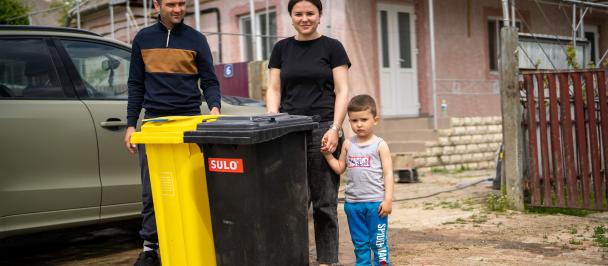Ocnița, the city that has made climate change adaptation a priority
September 29, 2023

Street lighting with energy-efficient LED bulbs, a local kindergarten equipped with photovoltaic panels to save energy consumption, and dozens of projects written and submitted to various donors to attract investments aimed at increasing the community's resilience to climate change – these are the achievements of the city of Ocnița, which has set a goal in recent years to mitigate the negative effects of global warming.
Half in jest, half seriously, the people of Ocnița say they have managed to be one step ahead of national authorities. This is because a year ago, the City Council adopted the Local Action Plan for Climate Change, and since then, investments in the locality have been made taking climate change into account. In this process, the city administration was supported by experts from the UNDP Moldova project "Advancing Moldova’s National Climate Change Adaptation Project", funded by the Green Climate Fund.
Ocnița's deputy mayor, Marcel Gîrtopan, is convinced that communities that neglect the negative effects of climate change are actually exposing themselves to future economic risks. Flooding, droughts, or sudden temperature changes can cause considerable damage to agriculture, infrastructure, and local businesses:

Through the Local Action Plan for Climate Change, we have reviewed the way we manage the public budget. We all want to spend money wisely. How can we build roads or bridges without taking into account the high temperatures of recent years? It's like throwing money to the wind. The materials we use must be adapted to climate change. Otherwise, the infrastructure will not withstand their impact."Ocnița's deputy mayor Marcel Gîrtopan
The deputy mayor says that the initiative to introduce climate change adaptation into the priorities of local development was unanimously supported by local councillors. No one doubted that through investments in renewable energy, energy efficiency, and climate-resilient infrastructure, the city can become more competitive, attracting long-term investments. Furthermore, managers of public institutions in the city have shown interest in projects aimed at reducing the negative effects of climate change.
For example, the administration of the "Ghiocel" kindergarten in Ocnița actively participated in the project to equip the institution with photovoltaic panels, which provide one-third of the electricity consumed.
The kindergarten's director, Mariana Costenco, believes that by developing environmentally friendly initiatives, she manages to educate children to be responsible towards nature:

"It is our duty to plant a seed of wisdom in our children so that they, as they grow up, have a responsible attitude towards the environment. This city is their legacy. For this reason, from an early age, we must explain to them what they can do to prevent possible environmental problems."
In recent years, more and more villages and towns in the country are interested in climate change adaptation plans. UNDP Moldova consultant, Ecaterina Melnicenco, says that this interest reflects a growing awareness on the part of local authorities and communities about the importance of protecting the environment. However, efforts to adapt to climate change, in addition to a commitment to future generations, are also a necessity in the face of current reality:
"The data used by experts in the field show that every dollar invested in the adaptation process prevents the spending of another seven dollars in the future to cover possible damages caused by climate change. I can hardly imagine that this process will succeed without close cooperation between national authorities, local authorities, and citizens. Adaptation starts with each of us. Citizens can contribute to adaptation efforts by saving energy, planting trees, or getting involved in community environmental protection projects. Authorities, in turn, can create policies and programs to encourage these actions."
At the end of August, the Government of the Republic of Moldova approved the National Climate Change Adaptation Programme until 2030 and its Action Plan. The programme, developed with the support of UNDP Moldova and the Green Climate Fund, sets objectives aimed at increasing the climate resilience of six essential sectors: agriculture, health, transportation, energy, water, and the forestry sector. The Republic of Moldova is one of Europe’s most climate change-vulnerable countries, particularly prone to floods and droughts.

 Locations
Locations











